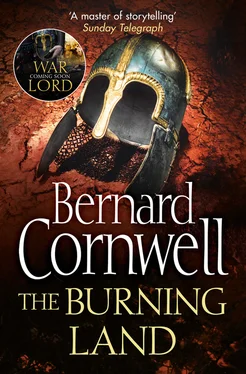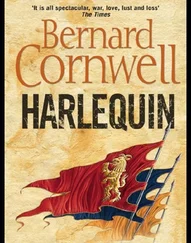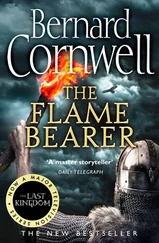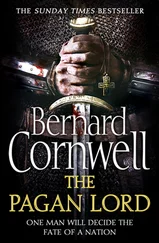‘I gave no oath to anyone else,’ I said, and I spoke honestly. In truth I had given another oath, and that oath would come back to find me, but it was so far from my mind that night that I believed I answered Gisela truthfully.
‘And when he’s dead?’
‘We go north,’ I said. North, back to my ancestral home beside the Northumbrian sea, a home usurped by my uncle. North to Bebbanburg, north to the lands where pagans could live without the incessant nagging of the Christians’ nailed god. We would go home. I had served Alfred long enough, and I had served him well, but I wanted to go home. ‘I promise,’ I told Gisela, ‘on my oath, we will go home.’
The gods laughed.
We crossed the bridge at dawn, three hundred warriors with half as many boys who came to tend the horses and carry the spare weapons. The hooves clattered loud on the makeshift bridge as we rode towards the pyres of smoke that told of Wessex being ravaged. We crossed the wide marsh where, at high tide, the river puddles dark among lank grasses, and climbed the gentle hills beyond. I left most of the garrison to guard Lundene, taking only my own household troops, my warriors and oath-men, the fighters I trusted with my own life. I left just six of those men in Lundene to guard my house under the command of Cerdic, who had been my battle-companion for many years and who had almost wept as he had pleaded with me to take him. ‘You must guard Gisela and my family,’ I had told him, and so Cerdic stayed as we rode west, following tracks trampled by the sheep and cattle that were driven to slaughter in Lundene. We saw little panic. Folk were keeping their eyes on the distant smoke, and thegns had placed lookouts on rooftops and high among the trees. We were mistaken for Danes more than once, and there would be a flurry as people ran towards the woods, but once our identity was discovered they would come back. They were supposed to drive their livestock to the nearest burh if danger threatened, but folk are ever reluctant to leave their homes. I ordered whole villages to take their cattle, sheep and goats to Suthriganaweorc, but I doubt they did. They would rather stay until the Danes were breathing down their throats.
Yet the Danes were staying well to the south, so perhaps those villagers had judged well. We swerved southwards ourselves, climbing higher and expecting to see the raiders at any moment. I had scouts riding well ahead, and it was mid-morning before one of them waved a red cloth to signal he had seen something to alarm him. I spurred to the hill crest, but saw nothing in the valley beneath.
‘There were folk running, lord,’ the scout told me. ‘They saw me and hid in the trees.’
‘Maybe they were running from you?’
He shook his head. ‘They were already panicked, lord, when I saw them.’
We were gazing out across a wide valley, green and lush beneath the summer sun. At its far side were wooded hills and the nearest smoke pyre was beyond that skyline. The valley looked peaceful. I could see small fields, the thatched roofs of a village, a track going west, and the glimmer of a stream twisting between meadows. I saw no enemy, but the heavy-leafed trees could have hidden Harald’s whole horde. ‘What did you see exactly?’ I asked.
‘Women, lord. Women and children. Some goats. They were running that way.’ He pointed westwards.
So the fugitives were fleeing the village. The scout had glimpsed them between the trees, but there was no sign of them now, nor of whatever had made them run. No smoke showed in this long wide valley, but that did not mean Harald’s men were not there. I plucked the scout’s reins, leading him beneath the skyline, and remembered the day, so many years before, when I had first gone to war. I had been with my father, who had been leading the fyrd, the host of men plucked from their farmlands who were mostly armed with hoes or scythes or axes. We had marched on foot and, as a result, we had been a slow, lumbering army. The Danes, our enemy, had ridden. Their ships landed and the first thing they did was find horses, and then they danced about us. We had learned from that. We had learned to fight like the Danes, except that Alfred was now trusting to his fortified towns to stop Harald’s invasion, and that meant Harald was being given the freedom of the Wessex countryside. His men, I knew, would be mounted, except he led too many warriors, and so his raiding parties were doubtless still scouring the land for yet more horses. Our first job was to kill those raiders and take back any captured horses, and I suspected just such a band was at the eastern end of the valley. I found a man in my ranks who knew this part of the country. ‘Edwulf has an estate here, lord,’ he said.
‘Edwulf?’
‘A thegn, lord.’ He grinned and used a hand to sketch a bulge in front of his stomach. ‘He’s a big fat man.’
‘So he’s rich?’
‘Very, lord.’
All of which suggested some Danes had found a plump nest to plunder, and we had found an easy prey to slaughter. The only difficulty was getting three hundred men across the skyline without being seen from the valley’s eastern end, but we discovered a route that was shrouded by trees, and by midday I had my men hidden in the woods to the west of Edwulf’s estate. Then I baited the trap.
I sent Osferth and twenty men to follow a track that led south towards the smoke pyres. They led a half-dozen riderless horses and went slowly, as if they were tired and lost. I ordered them never to look directly at Edwulf’s hall where, by now, I knew the Danes were busy. Finan, who could move among trees like a ghost, had crept close to the hall and brought back news of a village with a score of houses, a church and two fine barns. ‘They’re pulling down the thatch,’ Finan told me, meaning the Danes were searching the roofs of all the buildings, because some folk hid their treasures in the thatch before they fled. ‘And they’re taking turns on some women.’
‘Horses?’
‘Just women,’ Finan said, then caught my glance and stopped grinning. ‘They’ve a whole herd of horses in a paddock, lord.’
So Osferth rode, and the Danes took the bait like a trout rising to a fly. They saw him, he pretended not to see them, and suddenly forty or more Danes were galloping to intercept Osferth, who pretended to wake to the danger, turned westwards and galloped across the front of my hidden men.
And then it was as simple as stealing silver from a church. A hundred of my men crashed from the trees onto the flank of the Danes, who had no chance to escape. Two of the enemy turned their horses too fast and the beasts went down in a screaming chaos of hooves and turf. Others tried to turn back and were caught by spears in their spines. The experienced Danes swerved towards us, hoping to ride straight through our charge, but we were too many, and my men curled around the enemy horsemen so that a dozen were trapped in a circle. I was not there. I was leading the rest of my men to Edwulf’s hall, where the remainder of the Danes were running to mount their horses. One man, bare below the waist, scrambled away from a screaming woman and twisted as he saw me coming. Smoka, my horse, slowed, the man dodged again, but Smoka needed no guidance from me, and Serpent-Breath, my sword, took the man in the skull. The blade lodged there, so that the dying Dane was dragged along as I rode. Blood sprayed up my arm, then at last his twitching body fell away.
I spurred on, taking most of the men east of the settlement, and so cutting off the retreat of the surviving Danes. Finan had already sent scouts to the southern hill crest. Why, I wondered, had the Danes not posted sentinels on the hilltop from which we had first seen the fugitives?
There were so many skirmishes in those days. The Danes of East Anglia would raid the farmlands about Lundene, and we would retaliate, taking men deep into Danish territory to burn, kill and plunder. There was officially a peace treaty between Alfred’s Wessex and East Anglia, but a hungry Dane took no notice of words on parchment. A man who wanted slaves, livestock, or simply wanted an adventure, would cross into Mercia and take what he wanted, and we would then ride east and do the same. I liked such raids. They gave me a chance to train my youngest men, to let them see the enemy and cross swords. You can drill a man for a year, practise sword craft and spear skills forever, but he will learn more in just five minutes of battle.
Читать дальше












